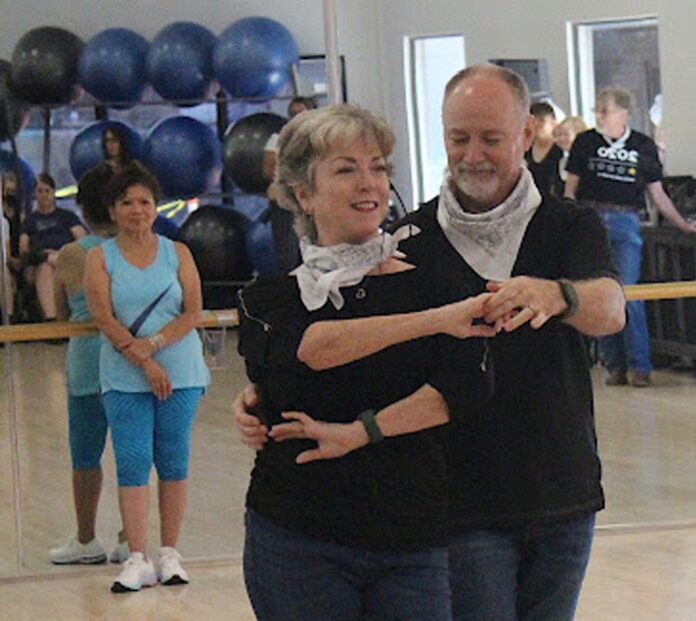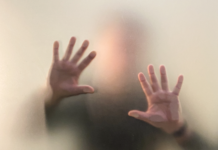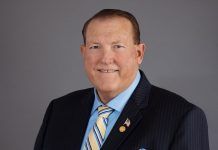Oasis adult learning center at Grossmont Center hosted an Aug. 29 event intended to encourage students aged 50-plus ‘back to school’ at the facility’s art studio, lecture hall, tech tank, dance hall or online forums.
Over 400 adults turned up for the Taste of Oasis event, Chief Executive Officer Simona Valenciute said. Once inside, they were able to connect with drama, philosophy, music and singing teachers, among others, or gather information on reduced electricity pricing, medical options and other business needs from the vendors on hand.
Jeanne Neilson, leaning on the baby grand piano where she gives weekly lessons, said she gets many students who have never had a music lesson in their life.
“We jump right in. It’s like: let’s get going already. I tell them, I’ll teach you the chords and then you’ll be on your way,”
Neilson said with a chortle, holding up a ‘fake book’ designed for newer pianists. Learning to play the piano is “so good for the brain” because you’re using both hands, Neilson said, “a real brain teaser that fires things up” as it forces students to concentrate.
“It isn’t only about the music, it’s also about taking with students. We only have so many hours in the day and I tell them to schedule ‘worry time’, say from 12 to 12:15 so you can fret and then you have to put aside your worries when that time is over,” Neilson said.
A growing number of studies, Valenciute said, suggest adults should measure “not just chronological age but also biological age, the components that translate to the age your body actually is. Anecdotally, we see that once people start coming to Oasis, they don’t stop for decades. Together, they get intellectual stimulation, physical stimulation and social connectedness,” Valenciute said.
The more people plug into classes, Valenciute said, the more social groups they instantly belong to.
“We see it with a few series of classes, like language classes that progress. People come and go but you continue building that level of knowledge. You see it in art classes where you keep practicing and exercise classes where you continue building rhythm. After class, some people go out to lunch together, catch up on life. Their social circle multiplies and suddenly their group is pulsating with all these different activities and they find people who are interested and interesting,” Valenciute said.
Over the course of the COVID-19 pandemic, staff was first challenged by creating online classes then further adapting those classes for a hybrid setting as in-person events opened up again.
“Before the pandemic everything was in person. Today, we have fully in person, online and hybrid classes. The hybrid is the most difficult. Peter Bolland’s classes are a good example— he taught a hybrid class last week and 90 people were registered but we had no idea what the distribution would be: would he end up in a lecture hall with two people and 88 more online? However, every time we ask if we should just discontinue the hybrid format, we’ve decided to keep going because people do get sick and it allows us to reach people we wouldn’t normally reach. Meanwhile, we’ve gained an audience that is not hyperlocal,” Valenciute said.
Chatting outside the facility with friends, an Oasis regular who identified herself only as Debbie said it is amazing how well online courses work out with a good instructor at the lead.
“I just got to learn from a Fordham University professor who teaches at Oasis. The thing online does so well is offer tremendous flexibility. It allows me to avoid extensive and expensive transportation. There is access without having to go someplace,” Debbie said.
“We all learned during the pandemic how to be online together. It’s kind of remarkable to have about 90 people per week sign up for an online lecture with 30 of them attending live and 60 on video. The on-demand medium opened up content for a whole new base of people,” Bolland said.
Although Bolland said there is some concern about protecting intellectual content, having online capabilities means people across the nation can tune in and participate.
Would-be students who have not yet learned how to access online courses can contact Wiseboomer founder and Oasis teacher Jacki Montieth, who teaches older adults how to use computer technology.
“I tell them: whether or not you accept it, technology affects your quality of life. What if your doctor wants to schedule a video call? Do you have that ability? Baby boomers are smart, they’ve learned so much— they can handle tech,” Montieth said in a confident tone.
At the next table over, drama teacher Jo-Darlene Reardon, who has acted for decades across the county, said she builds confidence in her students with each monologue they memorize, asks them to use their fears in person as fodder for performance energy.
“I have them learn scenes, monologues, do audition prep if they’re interested in trying for community theater. My only rule is they have to memorize everything. Anybody can read but memorizing is good for the mind,” Reardon said.
Singing instructor David Dooley said he’s noticed how much more emotion people bring to in-person classes after surviving the pandemic.
“People are so much more appreciative of getting together than they were before,” Dooley said.
Coming up, Valenciute said Oasis will be opening a new facility in Rancho Bernardo with twice as much space.
“It will be right next to the library in Rancho Bernardo with 20,000 square feet of space and will have new components like a kitchen to launch healthy eating and cooking classes,” Valenciute said, in addition to a larger technology and innovation center.
The largest healthy aging study in the world is called Successful Aging, Valenciute said and although the book is now about 15 years old, subsequent studies have confirmed the importance of a three-pronged approach to healthy aging. Stimulate your mind, your body, and have a meaningful social activity that gives you purpose to get up and get out, Valenciute said.














